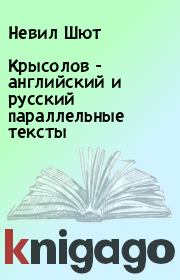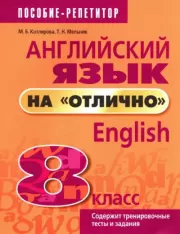Илья Михайлович Франк - Английский язык c дружелюбным скелетом. Легенды североамериканских индейцев
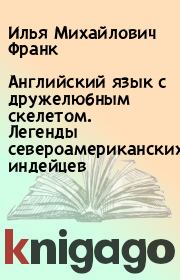 | Название: | Английский язык c дружелюбным скелетом. Легенды североамериканских индейцев |
Автор: | Илья Михайлович Франк | |
Жанр: | Языкознание | |
Изадано в серии: | неизвестно | |
Издательство: | неизвестно | |
Год издания: | - | |
ISBN: | неизвестно | |
Отзывы: | Комментировать | |
Рейтинг: | ||
Поделись книгой с друзьями! Помощь сайту: донат на оплату сервера | ||
Краткое содержание книги "Английский язык c дружелюбным скелетом. Легенды североамериканских индейцев"
Аннотация к этой книге отсутствует.
Читаем онлайн "Английский язык c дружелюбным скелетом. Легенды североамериканских индейцев" (ознакомительный отрывок). [Страница - 2]
messenger [`mesInGq], chestnut [`CesnAt], acorn [`eIkLn], report [rI`pLt]
Food was getting scarce in the mountains, and the council was to decide what to do about it. They had sent out messengers all over, and while they were talking two bears came in and reported that they had found a country in the low grounds where there were so many chestnuts and acorns that mast was knee deep.
Then they were all pleased (тогда они были = стали все довольны), and got ready for a dance (и приготовились к танцу), and the dance leader was the one (и руководитель танца = ведущий в танце был тот) the Indians call "Long Hams" (/кого/ индейцы называют Длинные Ляжки), a great black bear that is always lean (огромный черный медведь, который всегда /остается/ тощим). After the dance the bears noticed the hunter's bow (после танца медведи заметили лук охотника) and arrows (и стрелы), and one said (и один сказал), "This is what men use to kill us (это /то/, что люди используют, чтобы убивать нас). Let us see (давайте посмотрим) if we can manage them (сможем ли мы управиться с ними), and may be we can fight man (и, может быть, мы сможем сражаться с человеком) with his own weapons (его собственным оружием)." So they took the bow and arrows (поэтому они взяли лук и стрелы) from the hunter to try them (у охотника, чтобы попробовать).
lean [lJn], manage [`mxnIG], fight [faIt]
Then they were all pleased, and got ready for a dance, and the dance leader was the one the Indians call "Long Hams," a great black bear that is always lean. After the dance the bears noticed the hunter's bow and arrows, and one said, "This is what men use to kill us. Let us see if we can manage them, and may be we can fight man with his own weapons." So they took the bow and arrows from the hunter to try them.
They fitted the arrow (они приладили стрелу) and drew back the string (и тянули назад тетиву; to draw), but when they let go (но когда они отпустили) it caught in their long claws (она зацепилась за их длинные когти; to catch) and the arrows dropped to the ground (и стрелы упали на землю). They saw that they could not use the bow and arrows (они увидели, что они не могли пользоваться луком и стрелами) and gave them back to the man (и отдали их назад человеку). When the dance and the council were over (когда танец и совет были закончены; to be over), they began to go home (они начали расходиться по домам), excepting the White Bear chief (исключая = за исключением Белого Медведя-вождя), who lived there (который жил там), and at last the hunter and the bear went out together (и наконец охотник и медведь вышли вместе).
claw [klL], over [`quvq], use [ju:z], back [bxk], excepting [Ik`septIN]
They fitted the arrow and drew back the string, but when they let go it caught in their long claws and the arrows dropped to the ground. They saw that they could not use the bow and arrows and gave them back to the man. When the dance and the council were over, they began to go home, excepting the White Bear chief, who lived there, and at last the hunter and the bear went out together.
They went on (они шли) until they came to another hole (пока они не пришли к другой берлоге) in the side of the mountain (в склоне горы), when the bear said (когда = и тут медведь сказал), "This is where I live (это = вот где я живу)," and they went in (и они вошли внутрь). By this time the hunter was very hungry (к этому времени охотник был очень голоден) and was wondering (и размышлял/задавался вопросом) how he could get something to eat (как он мог раздобыть что-либо поесть). The other knew his thoughts (другой = медведь знал его мысли), and sitting up on his hind legs (и, усевшись на свои задние ноги) he rubbed his stomach with his forepaws (он потер свой живот своими передними лапами)—so (/вот/ так)—and at once he had both paws full of chestnuts (и сразу же у него обе лапы наполнились каштанами: «обе лапы /стали/ полны каштанов») and gave them to the man (и /он/ дал их человеку).
hole [hqul], hind [haInd], stomach [`stAmqk], forepaw [`fLpL]
They went on until they came to another hole in the side of the mountain, when the bear said, "This is where I live," and they went in. By this time the hunter was very hungry and was wondering how he could get something to eat. The other knew his thoughts, and sitting up on his hind legs he rubbed his stomach with his forepaws—so—and at once he had both paws full of chestnuts and gave them to the man.
He rubbed his stomach again (он потер свой живот снова)—so (вот так)—and had his paws full of huckleberries (и его лапы наполнились черникой), and gave them to the man (и /он/ дал их человеку). He rubbed again (он потер снова)—so (вот так) —and gave the man both paws full of blackberries (и дал/протянул человеку обе лапы, полные ежевики). He rubbed again (он потер снова)—so (вот так) —and had his paws full of acorns (и его лапы наполнились желудями), but the man said (но человек сказал) that he could not eat them (что он не мог есть их), and that he had enough already (и что он съел уже достаточно).
full [ful], already [Ll`redI]
He rubbed his stomach again—so—and had his paws full of huckleberries, and gave them to the man. He rubbed again—so —and gave the man both paws full of blackberries. He rubbed again—so —and had his paws full of acorns, but the man said that he could not eat them, and that he had enough already.
The hunter lived in the cave with the bear all winter (охотник жил в пещере с медведем всю зиму), until long hair like that of a bear (пока длинные волосы, как те, /что/ у медведя; until — /до тех пор/ пока /не/) began to grow all over his body (/не/ начали расти по всему его телу) and he began to act like a bear (и он /не/ начал вести себя как медведь); but he still walked like a man (но он
--">Книги схожие с «Английский язык c дружелюбным скелетом. Легенды североамериканских индейцев» по жанру, серии, автору или названию:
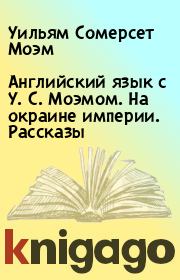 |
| Уильям Сомерсет Моэм - Английский язык с У. С. Моэмом. На окраине империи. Рассказы Жанр: Языкознание Серия: Метод обучающего чтения Ильи Франка |
Другие книги автора «Илья Франк»:
 |
| Илья Михайлович Франк, Raymond Douglas Bradbury - Английский язык с Р. Брэдбери. И грянул гром Жанр: Языкознание Серия: Метод обучающего чтения Ильи Франка |
 |
| Robert Louis Stevenson, Илья Михайлович Франк, Ольга Ламонова - Английский язык с Р. Л. Стивенсоном. Странная история доктора Джекила и мистера Хайда Жанр: Детективная фантастика |
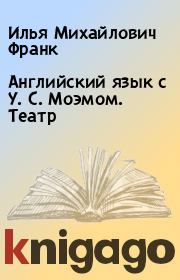 |
| Илья Михайлович Франк - Английский язык с У. С. Моэмом. Театр Жанр: Языкознание Год издания: 2007 |
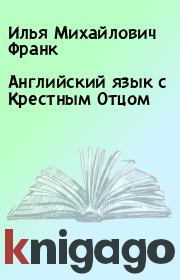 |
| Илья Михайлович Франк - Английский язык с Крестным Отцом Жанр: Языкознание Год издания: 2006 |


